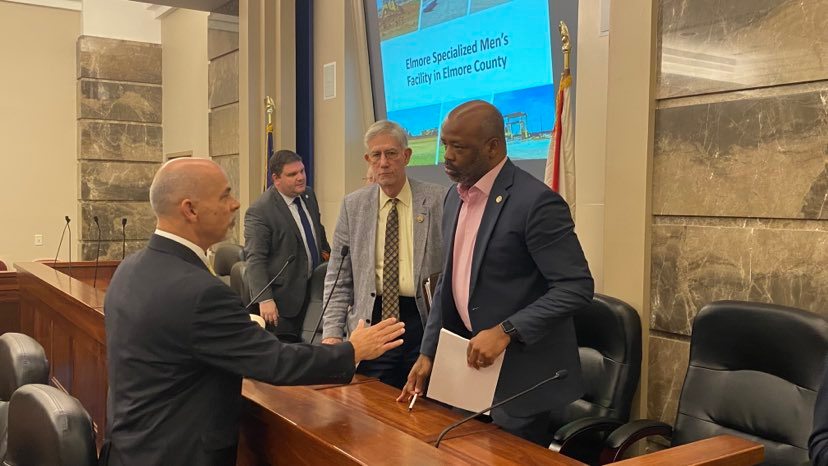Rep. Chris England, D-Tuscaloosa, called an executive order by Gov. Kay Ivey regarding good time an “executive overreach” Wednesday during a meeting of the Joint Legislative Prison Oversight Committee.
“I am struggling to find where the executive branch has the authority to do this executive order,” England said. “The more appropriate place would be in the Legislature to determine what sort of offense carries what sort of penalty … But that milk has already been spilt.”
Justin Barkley, chief deputy general counsel for the governor’s office, told England that the law passed by the Alabama Legislature gave the executive branch that authority.
“The statute says that if a prisoner commits any offense, all or any part shall be forfeited,” Barkley said. “Discretion was given to us in the executive branch. It also says the commissioner can restore any good time as the commissioner deems proper. The law as it is gives us that discretion.”
Barkley said the determination is already being made on a day-to-day basis by hearing officers under the executive branch, and that the executive order specifying penalties only moved the determination up the ladder of the executive branch.
England also questioned the timing of the order coming after a weeks-long work stoppage within the prisons as a form of protest.
“One of the medium level violations is refusing to work,” England said. “If someone engages in peaceful protest to protest some of the most inhuman, worst conditions in the United States, they could lose their good time … Clearly this was a response to the work stoppage. It happened almost a couple of weeks after the stoppage concluded; it almost seems retaliatory.”
Barkley contested that characterization and said good time had been in the public conversation in large part to the murder of Deputy Brad Johnson by a man who had been let out of prison on good time, despite having previously escaped from prison and assaulted an officer.
Rep. Jim Hill, R-Moody, also asked about how the order works in the case of an escaped inmate, who would theoretically be subject to a separate charge of escape once apprehended.
“If someone escapes from the St. Clair Correctional Facility and they are charged with escape in St. Clari county, do you think they are going to get a bond?” Hill asked. “I don’t think they’re going to get a bond.”
Hill said it is important for those matters to go through the courts.
Barkley said the order is necessary first to immediately stop the accrual of good time while the prisoner is escaped, and secondly to more swifty revoke good time within the prison as the due process on the escape charge is a longer process.
“We know there are gaps that can happen,” Barkley said. “Previously if an inmate escaped, until they were recaptured and brought back for hearing, they were still in good-time earning status. As soon as they are in ‘escaped’ status, out of ‘good time’ status.”
The committee also questioned Barkley about how companion bills filed by Rep. Russell Bedsole, R-Anniston, and April Weaver, R-Anniston, would impact the prison population by drastically reducing good time accruals.
“There is potential concern for a snowball effect, once you start extending the time those folks are in, new folks are subject to that. There’s a potential to have a snowball effect,” Barkley said. “Whether the numbers would bear that concern out is something we have to dig into.”
The committee also discussed the impact that change could have on plea deals, as defense attorneys weigh the potential of good time as part of the incentive for plea deals.
Rep. Matt Simpson, R-Moody, noted that Alabama currently offers substantial good time opportunities comparatively to other states, possibly the most good time incentives in the country.
“although I do not agree with Sen. Weaver’s or Rep. Bedsole’s bill in concept, I believe the appropriate discretion is here and not the executive branch,” England added.
Barkely said about 10 percent, or roughly 3,000 individuals, are eligible for good time in Alabama.
Prison statistics
ADOC Commissioner John Hamm spoke to the commission about the status of new prison construction, debunking rumors of sinkholes and work stoppages at the Elmore County site.
Sen. Bobby Singleton, D-Greensboro, corroborated Hamm’s statement on the rumors, saying he also personally went to the site and observed that there were no sinkholes.
Hamm confirmed to Simpson that once prison construction is complete, there will not be any increase in the number of beds in the Alabama prison system, because Alabama is closing some of the older facilities.
Hamm responded that the state will have “pretty much” the same overcrowding issue that it faces right now, although the design of the prisons is expected to make prisons safer for both inmates and staff as well as making management of the facility smoother.
Due to litigation, Hamm wouldn’t say much on the topic of the department’s declining staffing numbers despite the Department of Justice’s orders to increase correctional staff, other than to say that the department is trying programs to increase recruiting and retention.
The department is also attempting a new program to crack down on cell phones within the prisons, which Hamm said is the system’s primary form of contraband.
“Cell phones run all the other contraband,” Hamm said.
Medical furlough
The committee discussed in earnest the possibility of issuing more medical furloughs or medical paroles in an attempt to save the state money on prison health care costs.
“I’m concerned about people who are incapacitated to the point they are simply not a threat to public safety,” Hill said. “I can’t give you every single example, but people on dialysis, chemotherapy, hospice care, people in such a condition mentally— ALS, Alzheimer’s— in situation where they simply are not a danger or minimal threat to public safety.”
England also questioned the number of medical furlough cases that have been reviewed and granted in the past year— Hamm said about 20 cases have come up and 10 granted out of an in-house prison population of around 19,000 individuals. England wondered aloud whether the statute needs to be altered to ensure what cases should be considered.
Simpson indicated legislation to come in the 2023 session to allow for more of these individuals to be granted medical paroles and move to Medicaid.



















































